|
|
|
Sort Order |
|
|
|
Items / Page
|
|
|
|
|
|
|
| Srl | Item |
| 1 |
ID:
106796
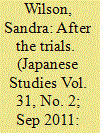

|
|
|
|
|
| Publication |
2011.
|
| Summary/Abstract |
'Lesser' Japanese war criminals, or those in Classes 'B' and 'C', were prosecuted by the various Allied powers in courtrooms around Asia after the Second World War. They were then executed or imprisoned in the places in which they had been tried. By the end of 1953, however, all surviving prisoners had been repatriated to Japan to serve out the remainder of their sentences, and by the end of 1958, all had been released. The decision to repatriate or release prisoners was made by the governments that had tried the war criminals, even after Japan regained its sovereignty in 1952, since the San Francisco Peace Treaty stipulated that the prosecuting countries retained the right to decide on any variation of the prisoners' sentences. The fate of convicted war criminals, therefore, was subject to diplomatic negotiation between Japan and the original prosecuting countries. These negotiations played an important role in the post-war reconfiguration of international relations in the East Asian region. Discussion about the repatriation and release of prisoners constituted one of the first topics of major international negotiation among a reconstructing Japan, the newly independent or decolonising nations of the region, the departing European imperial powers, a United States which was in the process of defining its Cold War aims in the region, and Australian governments seeking to establish a new foreign policy stance in the post-war world.
|
|
|
|
|
|
|
|
|
|
|
|
|
|
|
|
| 2 |
ID:
105149
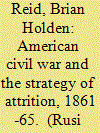

|
|
|
|
|
| Publication |
2011.
|
| Summary/Abstract |
The American Civil War is a leading example of attritional war. The Union's material superiority and control of public opinion, as well as tactical and organisational dominance, led to the surrender of the Confederacy, and its complete physical, moral, economic and financial collapse. It is important to remember, however, that the American Civil War was in many important respects quite different from the World Wars - and hence when we evaluate the use of attrition, we must do so through the historical lens of the nineteenth century.
|
|
|
|
|
|
|
|
|
|
|
|
|
|
|
|
| 3 |
ID:
101065
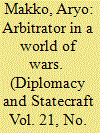

|
|
|
|
|
| Publication |
2010.
|
| Summary/Abstract |
The League of Nations is primarily remembered for its failures in the 1930s. Indeed, the established perception of its history usually emphasizes weaknesses. Failing to settle the question of which Power should possess the former Ottoman province of Mosul after the First World War, Turkey saw the dispute addressed to the League in summer 1924. Within a short time, a multi-leveled negotiation process that involved a large number of politicians, diplomats, and lawyers was put in motion. Sixteen months and many crises later, the League Council awarded the entire Mosul province to Iraq. The arbitration had been based upon data collected by two enquiry commissions comprising representatives from eight different Powers, the work of both numerous mediators, and a Council sub-committee. Though certainly not perfect, the League's role averted war and renewed disaster.
|
|
|
|
|
|
|
|
|
|
|
|
|
|
|
|
| 4 |
ID:
032401
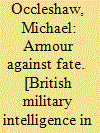

|
|
|
|
|
| Publication |
London, Columbus Books, 1989.
|
| Description |
xvi, 423p.
|
| Standard Number |
0862874076
|
|
|
|
|
|
|
|
|
|
|
|
Copies: C:1/I:0,R:0,Q:0
Circulation
| Accession# | Call# | Current Location | Status | Policy | Location |
| 030763 | 355.3432/OCC 030763 | Main | On Shelf | General | |
|
|
|
|
| 5 |
ID:
131294
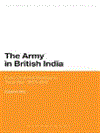

|
|
|
|
|
| Publication |
London, Bloomsbury, 2013.
|
| Description |
xi, 238p.Hbk
|
| Standard Number |
9781441177308
|
|
|
|
|
|
|
|
|
|
|
|
Copies: C:1/I:0,R:0,Q:0
Circulation
| Accession# | Call# | Current Location | Status | Policy | Location |
| 057785 | 954.03/ROY 057785 | Main | On Shelf | General | |
|
|
|
|
| 6 |
ID:
047532
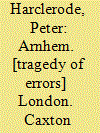

|
|
|
|
|
| Publication |
London, Caxton Editions, 1994.
|
| Description |
192p.Hbk
|
| Standard Number |
1840671467
|
|
|
|
|
|
|
|
|
|
|
|
Copies: C:1/I:0,R:0,Q:0
Circulation
| Accession# | Call# | Current Location | Status | Policy | Location |
| 043240 | 940.5421/HAR 043240 | Main | On Shelf | General | |
|
|
|
|
| 7 |
ID:
094721
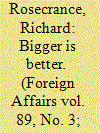

|
|
|
|
|
| Publication |
2010.
|
| Summary/Abstract |
After World War II, "trading states" seemed to be charting a new path forward. But small was not beautiful. Even great powers found themselves negotiating larger markets through economic associations with others. It's time the United States became such a power.
|
|
|
|
|
|
|
|
|
|
|
|
|
|
|
|
| 8 |
ID:
086179
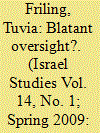

|
|
|
|
|
| Publication |
2009.
|
| Summary/Abstract |
Those acquainted with the history of the Yishuv know that a deep gap can be found in both the quality and the quantity of research on the role of labor and left wing circles in Israel's nation building process and the part attributed to the right wing. This gap extends to the representation of Revisionist activity in the areas of pre-WW II illegal immigration, wartime aid, and rescue of Europe's Jews, participation in the fighting and in resistance in Europe, clandestine cooperation with the Allies, as well as in Bricha, illegal immigration, arms procurement, and the building of the Yishuv's armed forces in the wake of the World War until the establishment of the State. Can this gap be readily dismissed by the cliché that history is written by the victors, and that the movement that led the nation-building process in those decades also perpetuated its role and uncompromisingly and systematically excluded others from the story? Or was there a "history" of revisionist activity that hasn't so far given rise to a historiography representing its role in fitting scope and quality? Or perhaps there was indeed such a "history", but the movement's leaders chose not to explore it for their own reasons, and it was they who directly or indirectly, openly or covertly, ousted themselves from the story or consciously and intentionally contributed to their own exclusion? This article provides several observations on the makeup of this gap, its boundaries, and possible roots.
|
|
|
|
|
|
|
|
|
|
|
|
|
|
|
|
| 9 |
ID:
065161
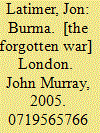

|
|
|
|
|
| Publication |
London, John Murray, 2005.
|
| Description |
xii, 610p.Pbk
|
| Standard Number |
0719565766
|
|
|
|
|
|
|
|
|
|
|
|
Copies: C:1/I:0,R:0,Q:0
Circulation
| Accession# | Call# | Current Location | Status | Policy | Location |
| 050003 | 940.5425/LAT 050003 | Main | On Shelf | General | |
|
|
|
|
| 10 |
ID:
105247
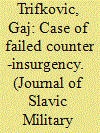

|
|
|
|
|
| Publication |
2011.
|
| Summary/Abstract |
This article examines operations "Weiss" and "Schwarz," two of the largest anti-guerrilla sweeps conducted by the German Wehrmacht during the entire Second World War. Four reinforced divisions with ca. 65,000 German soldiers and up to 100 aircraft took part in what is regarded as the most ferocious fighting of the whole war in Yugoslavia. Although conducted with maximum effort in material terms, they were doomed to failure because of the Third Reich's neglect of guerrilla warfare and the resulting lack of a sound counter-insurgency doctrine. Remarkably, operations "Weiss" and "Schwarz" are almost unknown to the public in the West, despite their sheer size. As the founding myths of socialist Yugoslavia, they were extensively written about, almost always from a Partisan perspective. This is the first article to describe the events from the German point of view, and to analyze the Wehrmacht's conduct of these operations in some depth. With the ongoing COIN campaigns in Iraq and Afghanistan, examining the lessons from the past can prove enlightening.
|
|
|
|
|
|
|
|
|
|
|
|
|
|
|
|
| 11 |
ID:
130374
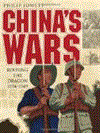

|
|
|
|
|
| Publication |
Oxford, Osprey Publishing, 2013.
|
| Description |
408p.hbk
|
| Standard Number |
9781782004073
|
|
|
|
|
|
|
|
|
|
|
|
Copies: C:1/I:0,R:0,Q:0
Circulation
| Accession# | Call# | Current Location | Status | Policy | Location |
| 057733 | 951/JOW 057733 | Main | On Shelf | General | |
|
|
|
|
| 12 |
ID:
103271
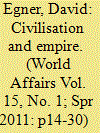

|
|
|
| 13 |
ID:
098266
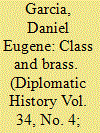

|
|
|
| 14 |
ID:
129465
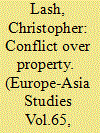

|
|
|
|
|
| Publication |
2013.
|
| Summary/Abstract |
This article examines housing conflicts during times of displacement in World War II and its aftermath. It looks specifically at the property experiences of eastern Poles in the western Polish town of Zielona Góra after forced displacement from the Soviet Union. It explores the intricate relationship between property and population displacement. By examining a micro-historical process at a time when property relations were in flux, we can investigate how displaced people negotiated spaces for themselves within a complicated set of realities. The article also adds to work done on state-society relationships in immediate post-World War II Poland.
|
|
|
|
|
|
|
|
|
|
|
|
|
|
|
|
| 15 |
ID:
123909
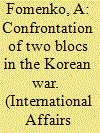

|
|
|
|
|
| Publication |
2013.
|
| Summary/Abstract |
IN THE LATTER HALF of the 1940s, due to Japan's defeat in World War the political landscape in the Far East significantly changed the balance of forces seeking political domination in this part of the world.
Leaders of all democratic victor nations, simultaneously but for different reasons, shifted their support from Chiang Kai-shek and his government of "reactionary" Nationalists to "progressive" Chinese Communists.
|
|
|
|
|
|
|
|
|
|
|
|
|
|
|
|
| 16 |
ID:
050922
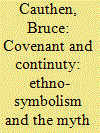

|
|
|
|
|
| Publication |
Jan-Apr 2004.
|
|
|
|
|
|
|
|
|
|
|
|
|
|
|
|
| 17 |
ID:
047625
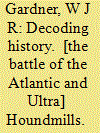

|
|
|
|
|
| Publication |
Houndmills, Macmillan Press Ltd, 1999.
|
| Description |
xvii, 263p.Hbk
|
| Standard Number |
0333693035
|
|
|
|
|
|
|
|
|
|
|
|
Copies: C:1/I:0,R:0,Q:0
Circulation
| Accession# | Call# | Current Location | Status | Policy | Location |
| 043539 | 909/GAR 043539 | Main | On Shelf | General | |
|
|
|
|
| 18 |
ID:
095616
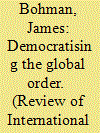

|
|
|
|
|
| Publication |
2010.
|
| Summary/Abstract |
While there is much discussion of the need for democracy in transnational institutions, there is less discussion of the conditions for their democratisation. To address this deficit, a general account of democratisation is necessary. I propose that democratisation is dependent on the joint realisation of two conditions: communicative freedom and communicative power. Democratisation thus requires, first, publics and associations in which communicative freedom is realised on the one hand; and, second, institutions that link such freedom to the exercise of communicative power to decision making on the other. In order for these conditions to be met, civil society must be expanded into the public sphere. The transformation of communicative freedom into communicative power can be promoted only by institutions that recognise the decisional status of publics, which in turn depend on civil society to generate the deliberative benefits of the plurality of perspectives. Communicative power is not merely spontaneously generated through publics, but also through publics expressly formed through democratic institutional design.
|
|
|
|
|
|
|
|
|
|
|
|
|
|
|
|
| 19 |
ID:
100876
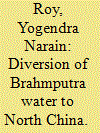

|
|
|
| 20 |
ID:
131425
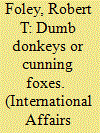

|
|
|
|
|
| Publication |
2014.
|
| Summary/Abstract |
The idea that the armies of the First World War were incapable of learning is one of the most enduring myths of the conflict. This image of 'lions led by donkeys' has proved difficult to modify, despite the sizeable scholarly literature on the tactical, technological and organizational adaptation and innovation undergone by all armies during the war. By examining the British and German armies as learning organizations during the war, this article contributes to the growing literature on wartime adaptation and innovation, as well as the wider literature on organizational learning in wartime. It demonstrates how the organizational cultures of these two armies shaped the way in which they learned, predisposing the British army towards radical, often technological, solutions to the tactical and operational challenges of the First World War battlefield, while inclining the German army towards incremental and tactical solutions to the same problems.
|
|
|
|
|
|
|
|
|
|
|
|
|
|
|
|
|
|
|
|
|